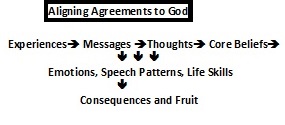“Why Do I Behave The Way I Do, And How Can I Change?”

 How often have you wondered why you do what you do? Often our behaviors aren’t what we want to do, but we feel powerless to change them. Maybe you yell at a friend or suddenly realize you’ve eaten the entire bag of chips instead of a handful. Maybe one drink turned into an entire night at the bar, or an errand for just one item at the mall resulted in a maxed out credit card and bags of things you don’t need. Every day we face difficult external circumstances that cause us to justify our behaviors, but justifying them doesn’t make us feel better or change them. The Bible describes the war we often feel when we do what we don’t want to do.
How often have you wondered why you do what you do? Often our behaviors aren’t what we want to do, but we feel powerless to change them. Maybe you yell at a friend or suddenly realize you’ve eaten the entire bag of chips instead of a handful. Maybe one drink turned into an entire night at the bar, or an errand for just one item at the mall resulted in a maxed out credit card and bags of things you don’t need. Every day we face difficult external circumstances that cause us to justify our behaviors, but justifying them doesn’t make us feel better or change them. The Bible describes the war we often feel when we do what we don’t want to do.
“I do not understand what I do.
For what I want to do I do not do, but what I hate I do.” Romans 7:16 NIV
To understand why you behave the way you do and to change it, you have to look deeper.
You do what you feel you have to so that your needs are met.
What are the needs that you’re trying to meet? We all have ten basic needs that have to be met. They are:
- Acceptance.
- Affection
- Appreciation
- Approval
- Attention
- Comfort
- Encouragement
- Respect
- Security
- Support
You have had these needs met in varying amounts by your family, and social circles; however, life experience have taken their toll and you may have fallen short of fully receiving these needs.
Sometimes the beliefs and behaviors that you adopt in your attempt to meet these needs are destructive. They mask themselves, deceiving you into believing you are meeting your needs. You may use a variety of unhealthy behaviors or substances to cope, such as overeating, overspending, gambling, alcohol, drug abuse, pornography, or any number of things. You’re not drawn to these things as a conscious choice, but rather you react to your environment and produce thought patterns, core beliefs, life and relationship skills to maneuver your way through life. If these are defined by unhealthy ways of meeting your needs, you are going to have negative consequences and create more struggles and stressful situations.
How do you replace those unhealthy ways of meeting your needs? It starts with looking at the foundation you build your life upon. In Matthew 7:24-27 Jesus tells us of the importance of a solid foundation:
“Therefore whoever hears these sayings of Mine, and does them, I will liken him to a wise man who built his house on the rock and the rain descended, the floods came, and the winds blew and beat on that house; and it did not fall, for it was founded on the rock. But everyone who hears these sayings of Mine, and does not do them, will be like a foolish man who built his house on the sand and the rain descended, the floods came, and the winds blew and beat on that house; and it fell. And great was its fall.”
You can examine and remove unhealthy foundations so that you can restructure your life to meet your needs in a way that produces life, hope, and healthy relationships. The chart below explains how our experiences eventually produce consequences and fruit in our lives:
We have all received message about ourselves from experiences, family, and friends. You received positive and negative messages from these sources and you processed them through your own personal filters to form opinions about yourself, which shaped your self-image. You have had successes and you have had failures. How have you let them define your personal identity? If you have, they are a part of your foundation.
When you develop faulty thinking about yourself, it alters your core beliefs and your behaviors which produce a ripple effect in every area of your life. This sends more messages that shape your self-worth and further define you. Your behaviors are not a factor in your worth, value, or identity. Unfortunately, most people cannot separate faulty behavior from identity.
God tells us: “For the Lord does not see as man sees; for man looks at the outward appearance, but the Lord looks at the heart.” I Samuel 16:7 NIV
The key to changing any behavior is to go back to the beginning. What one, or more, of the 10 Basic Needs are you trying to replace?
Your character is comprised of your personal features and traits that form your individual nature. Integrity is based on your adherence to ethical principles and character qualities. When your foundation is built on faulty thinking, your traits and moral or ethical qualities often fall short to protect your use of negative coping skills. Because you cling to destructive coping skills, these behaviors, life and relationship skills seem justified. Your core personality may have a real struggle with the character or integrity qualities that you display when you use negative behaviors to cope.
This affects how you see yourself and how others respond to you. Every message is like a brick that is laid, one on top of the other, forming a wall that strengthens your faulty core beliefs while you operate in the addictive system. This produces a marred identity, poor self-worth and even shame or contempt toward self.
You have value! You are a unique individual with things to offer, don’t let any substance or event get in the way of feeling good about yourself or receiving positive messages from others. If you’re willing to examine the foundation you’ve built your life upon and let God help you do the work to repair it, you can live a fulfilling life and feel good about yourself. You may feel weak, but God’s power is more than enough to change you if you let Him.
“But he said to me, “My grace is sufficient for you, for my power is made perfect in weakness…” 2 Corinthians 12:9
Dr. Michele
Copyright © 2013 by Michele Fleming, Ph.D.











Contact With Us